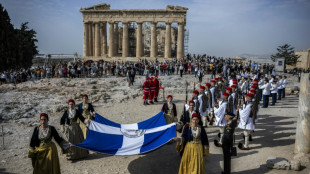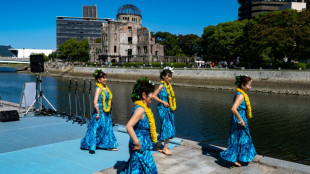
-
 40 nations contributing to UN Lebanon peacekeeping force condemn 'attacks'
40 nations contributing to UN Lebanon peacekeeping force condemn 'attacks'
-
Eight dead as heavy rain thrashes Brazil after long drought

-
 Jewish school in Canada hit by gunfire for second time
Jewish school in Canada hit by gunfire for second time
-
Morocco crush Central African Republic, Guirassy scores hat-trick

-
 Dupont scores quickfire hat-trick on Toulouse Top 14 return
Dupont scores quickfire hat-trick on Toulouse Top 14 return
-
Ronaldo scores in Portugal's Nations League win as Spain sink Denmark

-
 Interim boss Carsley has not applied for England job
Interim boss Carsley has not applied for England job
-
Mets hurler Senga ready to take on Dodgers in game one of NL Championship Series

-
 Ronaldo on target again as Portugal defeat Poland in Nations League
Ronaldo on target again as Portugal defeat Poland in Nations League
-
Guardians rip Tigers 7-3 to advance in MLB playoffs

-
 AFP, BBC win top French war reporting awards
AFP, BBC win top French war reporting awards
-
Carsley goes back to basics as humbled England face Finland

-
 Alex Salmond: the man who took Scotland to the brink of independence
Alex Salmond: the man who took Scotland to the brink of independence
-
Scotland's former leader Alex Salmond dies aged 69: party

-
 UN warns of catastrophe as Israel fights a two-front war
UN warns of catastrophe as Israel fights a two-front war
-
Croatia extend Scotland's losing streak

-
 South Africa, New Zealand boost T20 World Cup semi-final hopes
South Africa, New Zealand boost T20 World Cup semi-final hopes
-
'Very challenging': Israel faces Hezbollah in tricky terrain

-
 Farrell begins to feel at home as Racing 92 beat Toulon
Farrell begins to feel at home as Racing 92 beat Toulon
-
South Africa boost T20 World Cup semi-final hopes with Bangladesh win

-
 Samson ton powers India to T20 series sweep after record total
Samson ton powers India to T20 series sweep after record total
-
Djokovic to face Sinner in Shanghai final with 100th title in sight

-
 UN peacekeepers to remain in Lebanon: spokesman
UN peacekeepers to remain in Lebanon: spokesman
-
Pro-Conquest film fuels debate in Mexico over colonial legacy

-
 Samson ton powers India to record 297-6 in Bangladesh T20
Samson ton powers India to record 297-6 in Bangladesh T20
-
New Zealand enjoy perfect start to America's Cup defence over Britain

-
 Pogacar emulates icon Coppi with fourth straight Il Lombardia triumph
Pogacar emulates icon Coppi with fourth straight Il Lombardia triumph
-
UN warns against 'catastrophic' regional conflict

-
 New Zealand crush Ineos Britannia in America's Cup opener
New Zealand crush Ineos Britannia in America's Cup opener
-
Djokovic to face Sinner in blockbuster Shanghai Masters final

-
 With medical report Harris seeks to play health card against Trump
With medical report Harris seeks to play health card against Trump
-
Sri Lanka seeks to match success in W.Indies T20s

-
 Sinner reaches Shanghai final, will end year number one
Sinner reaches Shanghai final, will end year number one
-
China-EU EV tariff talks in Brussels end with 'major differences': Beijing

-
 Sabalenka downs Gauff in three sets to reach Wuhan final
Sabalenka downs Gauff in three sets to reach Wuhan final
-
Israel warns south Lebanon residents to 'not return'

-
 Sinner tames Machac to reach Shanghai Masters final
Sinner tames Machac to reach Shanghai Masters final
-
Buried Nazi past haunts Athens on liberation anniversary

-
 Harris to release medical report confirming fitness for presidency: campaign
Harris to release medical report confirming fitness for presidency: campaign
-
Nobel prize a timely reminder, Hiroshima locals say

-
 Hezbollah fires at Israel as wars rage on Yom Kippur
Hezbollah fires at Israel as wars rage on Yom Kippur
-
Analysts warn more detail needed on new China economic measures

-
 China tees up fresh spending to boost ailing economy
China tees up fresh spending to boost ailing economy
-
China says will issue special bonds to boost ailing economy

-
 China offers $325 bn in fiscal stimulus for ailing economy
China offers $325 bn in fiscal stimulus for ailing economy
-
Dodgers drop Padres 2-0 to advance in MLB playoffs

-
 Alexei Navalny wrote he knew he would die in prison in new memoir
Alexei Navalny wrote he knew he would die in prison in new memoir
-
Last-minute legal ruling allows betting on US election

-
 Despite hurricanes, Floridians refuse to leave 'paradise'
Despite hurricanes, Floridians refuse to leave 'paradise'
-
Israel observes Yom Kippur amid firestorm over Lebanon strikes


Alex Salmond: the man who took Scotland to the brink of independence
Alex Salmond, who died on Saturday aged 69, was for years the figurehead of Scottish independence, a wily political operator who divided opinion as he took the nationalist movement from the political fringes to the mainstream.
He never got to see his beloved Scotland break away from the rest of the United Kingdom, but he was making the case for the country to go its own way right to his last breath.
Salmond, who died after falling ill after making a speech in North Macedonia, stepped down as Scotland's first minister after losing the 2014 independence referendum, handing power to his deputy and one-time protegee Nicola Sturgeon.
But he remained a larger-than-life presence in the background, prompting some former colleagues in the Scottish National Party to suspect he was plotting a political comeback.
Just before the Scottish parliamentary elections in 2021, they were proved correct, as Salmond launched what he claimed would be a complementary nationalist movement -- Alba -- to deliver a "supermajority" for independence in the Edinburgh parliament.
With the SNP and Alba in Holyrood, he argued, the UK government in London could not ignore Scots' backing for independence -- or at least another referendum.
Alba, though, failed to win a seat in the devolved parliament, leaving Salmond out in the cold.
The SNP had already cast him adrift: a year earlier he fought for his personal reputation in the courts after being charged with sexual offences, including attempted rape.
With Scotland more than most a place of political skullduggery, the acquitted Salmond quickly pointed the finger at his enemies for having pushed for the prosecution.
Sturgeon had already pointedly distanced herself from her former mentor, and the bad blood reinforced rifts in the SNP between those loyal to the former leader and his successor.
- Pragmatist -
Alexander Eliott Anderson Salmond was born in 1954 in Linlithgow, near Edinburgh. Appropriately, he arrived on Hogmanay -- the Scots term for New Year's Eve, a night of whisky, song and dance beloved of Scots around the world.
After studies in economics and medieval history at St Andrews University, he became an economist with the Royal Bank of Scotland before entering the UK parliament.
In 1990 he took over the leadership of the SNP, moving it to the centre ground, four years before Labour's Tony Blair did the same.
David Torrance, author of "Salmond: Against the Odds", said both Salmond and Blair were more pragmatic than dogmatic and their slogan could be summed up as: "Whatever works".
In the first elections for the re-established Scottish parliament in 1999 -- created under Blair's leadership -- the SNP lost to Labour and Salmond quit as leader, claiming it was "forever".
But he was re-elected in 2004. "I changed my mind," he said.
Three years later, he was elected first minister of a minority SNP government in Edinburgh, then in 2011 won an absolute majority -- then the promise from London of a referendum.
- Regrets -
For loyal supporters, Salmond, who often sported tartan scarves and ties with the blue and white Saltire of Scotland, had unflagging determination and canny political know-how.
Detractors branded him arrogant and misogynistic with a penchant for populism.
From 2017, he presented a talk show on the Kremlin-funded channel RT, for which he was also criticised.
But both sides agreed that Salmond was one of the most talented politicians of his generation.
Just last month, Salmond, who had a passion for horse racing, fine wine, Indian curry, football and golf, said he regretted standing down as first minister, with independence seemingly off the table.
Sturgeon stepped down unexpectedly early last year. Labour's progress in Scotland at this year's UK general election could imperil the SNP's grip on power in the 2026 Scottish parliamentary vote.
For their critics, Salmond, Sturgeon and the SNP's push for independence came at the expense of addressing the day-to-day issues Scotland's parliament controlled: health, education, housing and transport.
"I thought to make a point of departure for the referendum in the future was a right thing for the national movement," Salmond told an ITV documentary in September. "Looking back, that was a mistake.
"Now, in retrospect, that was a daft thing to do. But then... I thought we were set for independence in a reasonable timescale.
"If you'd told me then that 10 years later, we'd still be waiting despite the manifest opportunities there have been, then I would have said, 'well, I'll just hang about then and see the matter through'."
Salmond leaves a wife, Moira, 87, whom he married in 1981. The couple had no children.
G.Schulte--BTB
